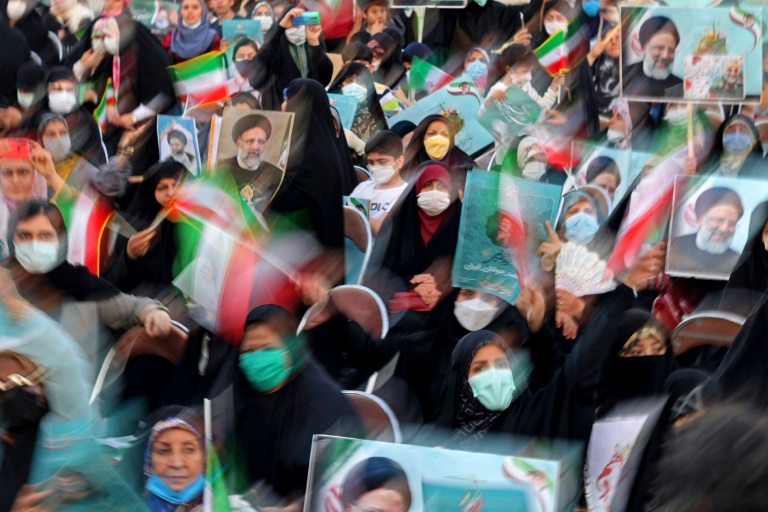The candidate field thinned out Wednesday for Iran’s presidential election in two days, in which a victory by ultraconservative cleric Ebrahim Raisi is widely seen as a foregone conclusion.
Two of the seven men approved to enter the lacklustre election race pulled out, further boosting the position of Raisi, 60, in a vote where turnout is predicted to hit a record low.
Ultraconservative lawmaker Alireza Zakani withdrew and pledged to support Raisi, hours after former vice president Mohsen Mehralizadeh, one of only two reformists allowed to run, had also thrown in the towel.
The election comes as economically ailing and pandemic-hit Iran is in talks with world powers to revive the battered 2015 nuclear deal and at pains to end a punishing US sanctions regime imposed under former president Donald Trump.
The vote will choose a successor to Iran’s moderate President Hassan Rouhani, the architect of that deal, who cannot run again now after serving two consecutive four-year terms, and who leaves office in August.
Ultimate power in Iran, where a 1979 revolution toppled the monarchy, lies with the supreme leader, Ayatollah Ali Khamenei, but the president has significant influence on issues from industrial policy to foreign affairs.
The expected winner, Raisi, the country’s judiciary chief and a cleric in a black turban and religious robe, has been mentioned in Iranian media as a possible successor to Khamenei.
Raisi belongs to the ultraconservative camp that most deeply distrusts the United States, labelled the “Great Satan” or the “Global Arrogance” in the Islamic republic, and which has harshly criticised Rouhani since the nuclear deal started to unravel.
– ‘Maximum pressure’ –
The landmark achievement of Rouhani’s eight years in power was the accord under which Tehran accepted limits on its nuclear programme in return for relief from international sanctions.
But hopes Iran would reap the benefits were dashed in 2018 when Trump ripped up the deal and launched a “maximum pressure” campaign aiming to diplomatically and economically isolate it.
The country of 83 million, blocked by the US from selling its oil to and trading with much of the world, was plunged into recession while Rouhani came under fire from ultraconservatives for having trusted the West.
Iran saw anti-government unrest in the winter of 2017-18 and again in November 2019 — harshly put down both times — before the Covid-19 pandemic came and hit Iran harder than any other country in the region.
An ultraconservative victory would mean that, months after US President Joe Biden ousted Trump, with his uncompromising stance on Iran, from the White House, the pendulum would swing the other way in Tehran.
Analysts however argue that this would be unlikely to derail talks in Vienna between Iran and the other remaining parties to the nuclear deal — Britain, China, France, Germany and Russia — which have been indirectly joined by the United States.
The pain of Trump’s ramped-up sanctions — which sparked a currency collapse, galloping inflation and spiralling job losses — is the unifying electoral theme, and all candidates agree that Iran’s top priority must be the lifting of sanctions.
In a live televised debate, Raisi avoided clashing with reformists, instead focusing on Iranians’ economic woes.
His remaining challengers include ex-Revolutionary Guards chief Mohsen Rezai, and the former central bank governor Abdolnasser Hemmati, who is seen as a reformist but lacks the support of the main reformist coalition.
– Call to vote –
If no candidate wins a clear majority on Friday, the two with the most votes will go head-to-head in a runoff a week later, on June 25.
Few campaign posters are visible in Tehran apart from those of Raisi, who took 38 percent of the vote in the last election in 2017, won by Rouhani.
The mood has been dampened by coronavirus restrictions on public gatherings, and observers expect many voters to abstain.
Last year’s parliamentary elections saw a 57 percent abstention rate and a conservative sweep of the legislature, after thousands of mostly reformist or moderate candidates were disqualified.
Tehran nursing student Narges, 20, like many young Iranians, said she was mainly concerned with making ends meet and worried about her future. Asked about the presidential election, she said she did not have “any particular feelings” about it.
Last month, the Iranian press had widely predicted a showdown between Raisi and moderate conservative Ali Larijani, an adviser to Khamenei.
But after the powerful Guardian Council barred Larijani and other heavyweights from the poll, those who remained in the race appeared unlikely to pose a serious challenge to Raisi.
With opposition groups outside Iran calling on social media for a boycott, Khamenei has urged Iranians to come out in droves to cast their ballots and prove wrong the “enemies of Islam”.










